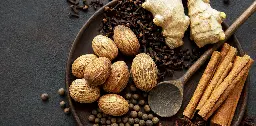How cinnamon, nutmeg and ginger became the scents of winter holidays, far from their tropical origins
How cinnamon, nutmeg and ginger became the scents of winter holidays, far from their tropical origins

theconversation.com
How cinnamon, nutmeg and ginger became the scents of winter holidays, far from their tropical origins


Thanks! It's a really interesting topic and I was excited to learn more. But I'm not sure the writer offered much to support their explanation for why these tropical spices are so closely associated with winter time in the north.
For example, I was underwhelmed by the "cinnamon is an antidiabetic, so it'll help process all those sugary treats you're eating over the holidays" fact. Does that really explain why cinnamon is associated with this season from a historical perspective? I can't say for sure that past generations weren't adding cinnamon to holiday foods because they knew it was an antidiabetic. But I'm going to continue doubting it until I see something persuasive.
The author could have supported their statements a little better, but scattered throughout the articles are reasons like:
So the very basic solution to the mystery is that winter foods are those that are usually harvested to be eaten during winter :-|
I don't think the author was trying to say that these spices are harvested in the fall and enjoyed in the winter. In fact, I think they are clearly saying the opposite.
And
Or, if they are trying to make that point, they are doing so in a way that includes contradictory details.
The one paragraph on "what makes spices warm" seems to be the only relevant part.